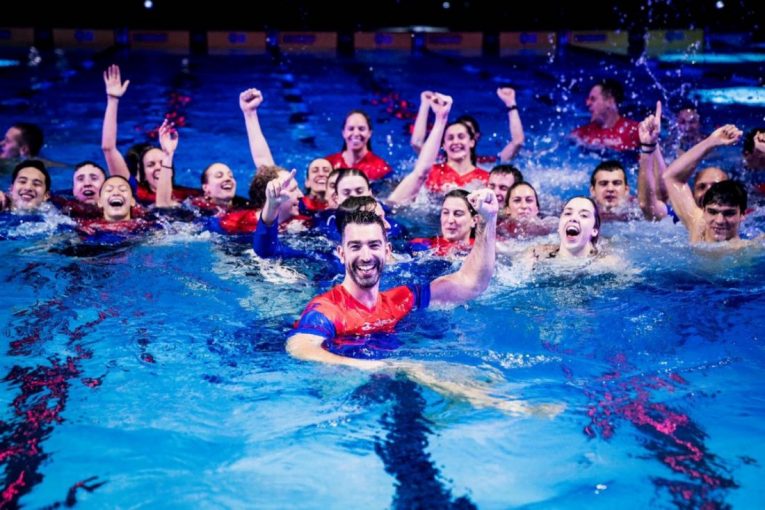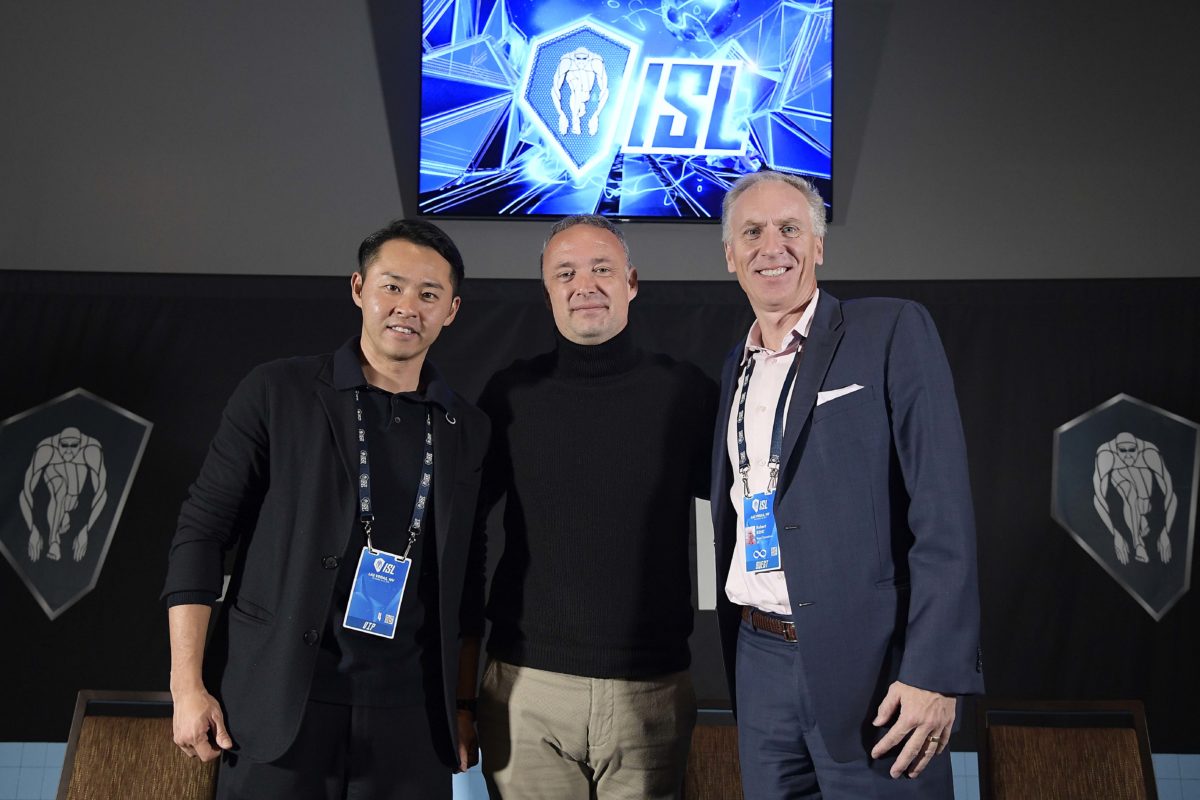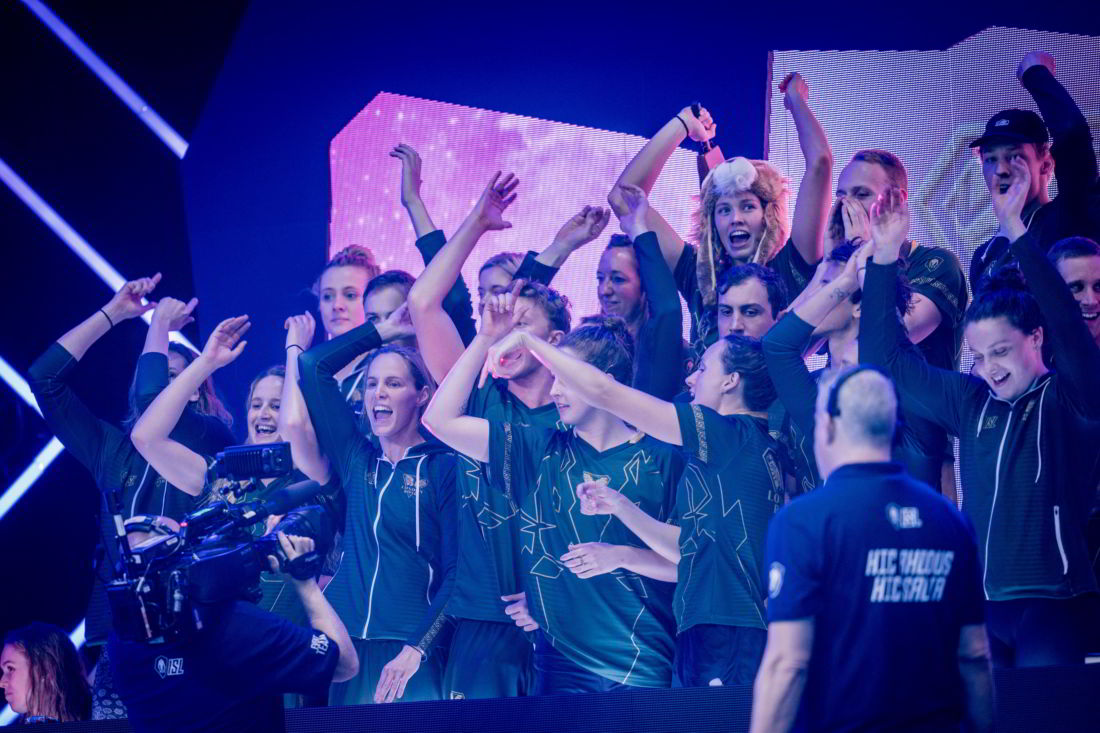Energy Standard Is The First ISL Champions And Looks Ahead to 2020-2021

Energy Standard is the first champions of the International Swimming League. In the Las Vegas Grand Finale, the performances of Daiya Seto in the individual races and the win of the 4×100 freestyle relay made possible the comeback. Sarah Sjostrom and Florent Manaudou completed it with their first and second places in the skin races, respectively.
Sarah Sjostrom’s win in the skin races not only helped the team to win the title, but it also allowed her to win the ISL Season MVP award which consists of $50 thousand USD. Only 3.5 points distanced her from Cali Condors star, Caleb Dressel, who came second with a total of 240 points.
“It means so much, I’m so proud of the team,” said Sjostrom. “It’s amazing to win the first ISL title. I’m very, very happy, first of all to win the title with my team, but also to win the MVP title, it feels amazing.”
A thriller in Las Vegas! @energy_standard are crowned the first-ever BEST SWIMMING TEAM IN THE WORLD! pic.twitter.com/vJPi9fUYpk
— International Swimming League (@iswimleague) December 21, 2019
As ISL 2019 comes to an end and the swimmers will now go back to train in the long course to be ready in the spring when most of the athletes will be looking make qualifying times to book a flight to Tokyo.
But what will happen to ISL next season?
The debut season of ISL was better than expected with the most prestigious international athletes taking part and pushing for its success.
“The first step is to expand ISL because seven matches are not enough and eight clubs are not enough,” Konstantin Grigorishin, founder and president of International Swimming club Energy Standard said ahead of the ISL London meet in November.
“Next season we are planning to organize 27 matches for ten clubs. The season will start in the middle of September and will finish at the beginning of April and each club will participate in ten-to-twelve matches.”
At the end of the Las Vegas Grand Finale, ISL announced the two teams that will join the competition next year. The names of the teams are not known yet, but it is known that four-time Olympic Champion Kosuke Kitajima will lead the Tokyo-based team for next season while Robert Kent will lead the Toronto-based one.

“The International Swimming League must be a truly global one, but our development needs to be sustainable,” said Grigorishin. “So, we are delighted to announce that one of our new clubs for next season will be in Tokyo – the global capital of sport in 2020.”
“Japan is one of the world’s leading swimming nations with a large fan-base, so we expect to see a very competitive team be developed there and many fans excited to learn of our plans.”
“It is fantastic we are able to bring our league to new audiences in Canada for next season,” added Grigorishin.
Tokyo-based team leader Kitajima expressed his excitement in the project, adding how the creation of a global swimming audience will elevate the sport.
“I am delighted and truly excited to be part of elevating the value of the sport of swimming in a global context,” said Kitajima. “The opportunity for swimmers to succeed in the professional arena is something that most of us only dreamt about.”
“ISL will make it possible for swimmers and their coaches to highlight their talent throughout the year on a global arena and inspire children to pursue the sport,” he added.
In this way, the ISL allows the athletes to compete with the best swimmers in the world during the entire season and not only during the summer when historically the most significant international competitions, like the World Championships or the Olympics have taken place.
“It will be a much bigger competition, but I think we need it because if you want to have more exposure and be on the screen, we have to compete more often,” said Grigorishin.
“Maybe we can extend to more clubs but I don’t think we can have more than 12 clubs in the next few years because we don’t have too many high-level swimmers.”
Most of the athletes competing in the ISL enjoyed the competition set up and the innovation that it brought to the sport. Many of them, including Sjostrom, Chad Le Clos, Guillherme Guido, Katinka Hosszu and Fabio Scozzoli highlighted the importance of the team aspect of this new format.
They also emphasized how the team’s support helps them during the race as they don’t want to disappoint their teammates and try to bring home the best result possible, even the events where they are less competitive.

“I think ISL is amazing because we can race in one night 4-5 times against the best swimmers in the world,” Florent Manaudou said at the end of the ISL London meet.
“Next year and the year after that is going to be a full year so it is amazing to be racing the whole year with the best swimmers in the world.”
As the new season approaches, the teams’ managers are looking to the other athletes that can improve the quality of their teams so to be more competitive next season. There are already some ideas and when the time for transfers come, the teams will compete to get the best swimmers on the roster of next season.
“We have a big gap with the best teams right now in some of the races,” Matteo Giunta, Aqua Centurions manager said at the end of the ISL London meet.
Although some great individual performances, like Fabio Scozzoli equaling his own European record in the 50 meters breaststroke, Aqua Centurions was not able to secure a spot in the Las Vegas Grand Finale.
“If the format stays the same, it is essential to be competitive in the relays and the skin races because that’s where you can gain a lot of points and make the difference,” said Giunta.
The focus of the next few months will be on Tokyo for the majority of the athletes and the coaches, but a new era for swimming has started. More international competitions are on the calendar next year, Turkey-based team Energy Standard will try to defend the title while the rest of the competitors will try to close the gap and fight to become next ISL champions.